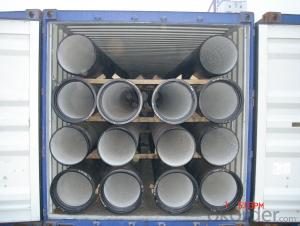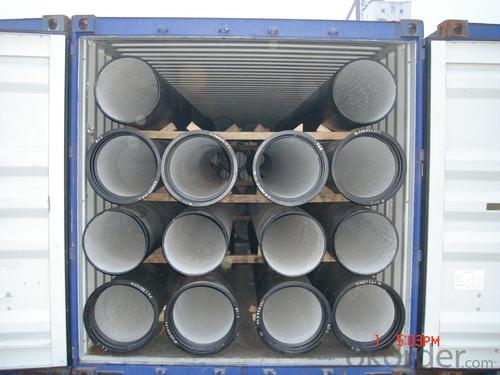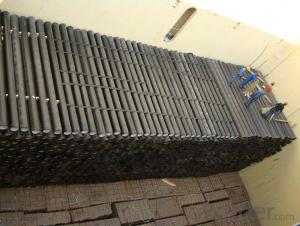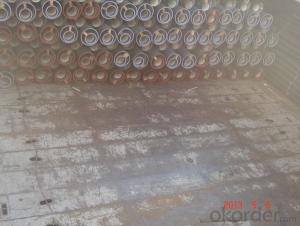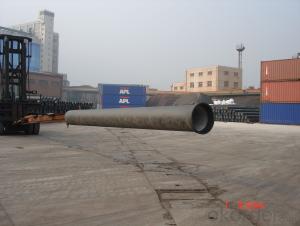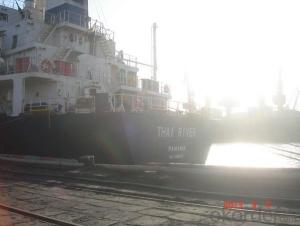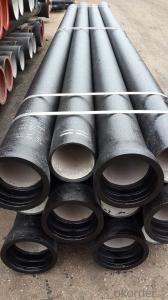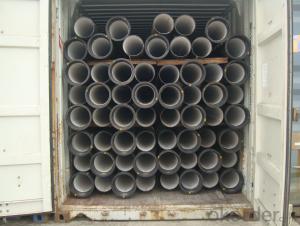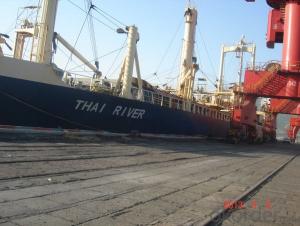DUCTILE IRON PIPES AND PIPE FITTINGS c CLASS DN800
- Loading Port:
- Tianjin
- Payment Terms:
- TT OR LC
- Min Order Qty:
- 25 pc
- Supply Capability:
- 30000 pc/month
OKorder Service Pledge
OKorder Financial Service
You Might Also Like
Material : Ductile Cast Iron
Size Range : DN 80mm to DN 2000mm
Unit Effective Length : 6m or 5.7m
Manufacture Standard: ISO 2531:1998/ EN 545:2006/EN 598:2007
Annual capacity : 200,000 tons
Coating Exterior: Zinc 130g/m2 according to ISO 8179-1 and bitumen coating 70 microns.
Cement Interior: Portland Cement/ High Alumina Cement/ Sulphate Resisting Cement Lining according to ISO 4179
Special requirements on external coating and internal lining can be applied
We also provide accessories such as SBR/EPDM rubber gaskets, lubricant paste, pipe caps, PE sleeves, etc.
Additional Parts:
Each pipe is strictly inspected according to related standard to ensure permanently high performance.
Easy Installation at site and service free for life
Long Service Lifespan
Quotation will arrive you within 24hours once we get your inquiry.
We guarantee offering you a competitive price.
A copy of original inspection reports of pipes will be offered after shipment.
Photos of loading process will be sent to the customer after shipment effect.
We will follow-up the delivery progress after shipment effect and update to the customer on weekly basis.
- Q: Are ductile iron pipes suitable for power plant applications?
- Yes, ductile iron pipes are suitable for power plant applications. Ductile iron is a type of cast iron that has enhanced strength, durability, and flexibility compared to traditional cast iron pipes. These properties make ductile iron pipes ideal for power plant applications where they are exposed to high pressure, extreme temperatures, and corrosive environments. Power plants often require a reliable and robust piping system to transport various fluids such as water, steam, and chemicals. Ductile iron pipes have high tensile strength and can withstand high pressure, ensuring the safe and efficient flow of these fluids within a power plant. Their ability to handle high-pressure steam makes them particularly suitable for power generation applications. Additionally, ductile iron pipes have excellent resistance to corrosion, which is crucial in power plants where many fluids can be highly corrosive. The internal and external linings of these pipes protect them from corrosion, ensuring a longer service life and reducing maintenance costs. This corrosion resistance also makes them suitable for transporting chemicals and wastewater within a power plant. Another benefit of ductile iron pipes is their ability to withstand extreme temperatures. Power plants often operate at high temperatures, and ductile iron pipes can handle these conditions without compromising their structural integrity. They have a high melting point and can resist thermal expansion and contraction, making them suitable for applications involving hot fluids and steam. Furthermore, ductile iron pipes are cost-effective compared to other materials commonly used in power plants, such as stainless steel or carbon steel. They offer a balance between performance and cost, making them an attractive choice for power plant applications. In conclusion, ductile iron pipes are well-suited for power plant applications due to their strength, durability, flexibility, corrosion resistance, and ability to withstand high pressures and extreme temperatures. Their cost-effectiveness further adds to their suitability for power plant piping systems.
- Q: Steel plastic pipe, ductile iron pipe, steel pipe difference
- The utility model has the advantages of wide application range, more connecting modes, suitable for most occasions, good sealing property, proper material selection and anticorrosion treatment, and can greatly increase the corrosion resistance.
- Q: Can ductile iron pipes be used in high-temperature applications?
- Yes, ductile iron pipes can be used in high-temperature applications. Ductile iron pipes have a higher melting point compared to other types of pipes such as PVC or HDPE, making them suitable for carrying fluids at elevated temperatures. The material properties of ductile iron, including its strength, toughness, and resistance to thermal stress, enable it to withstand higher temperatures without deforming or failing. However, it is important to note that the specific temperature limit for ductile iron pipes may vary depending on factors such as the grade of ductile iron used, the pressure of the fluid being carried, and the duration of exposure to high temperatures. Therefore, it is crucial to consult the manufacturer's specifications and guidelines to ensure that ductile iron pipes are appropriately selected and installed for high-temperature applications.
- Q: Ductile iron pipe converter, steel transition DN100 turn 100, what is the specific accessories name? Can you supply photos?
- Strong toughness: the pipe can be stretched to 5 times the original length without fracture, which is suitable for uneven geological conditions without affecting its link performance. In the case of a breach, there is no extension of the mouth due to the breach.
- Q: How does ductile iron pipe perform in areas with high soil contamination?
- Due to its inherent strength, durability, and corrosion resistance properties, ductile iron pipe is highly effective in areas with high soil contamination. The material used in manufacturing these pipes is highly resistant to chemical attack, making it suitable for handling various types of contaminated soils, including those with high levels of acids, alkalis, and other corrosive substances. The corrosion resistance of ductile iron pipes is primarily due to their protective internal and external linings. These linings are designed to prevent contact between the pipe material and the surrounding soil or fluids, acting as a barrier that prevents the penetration of corrosive elements and reduces the risk of pipe degradation or failure. Additionally, external coatings or cathodic protection systems can further enhance the resistance of ductile iron pipes to soil contamination, extending their service life. Compared to materials such as steel or concrete, ductile iron pipes offer significant advantages in areas with high soil contamination. Their high strength enables them to withstand external loads imposed by the contaminated soil, reducing the risk of structural failure or deformation. Furthermore, the inherent flexibility of ductile iron allows it to absorb ground movements or settlement without compromising its integrity, making it a reliable choice for areas prone to soil instability or shifting. Moreover, the smooth internal surface of ductile iron pipes minimizes friction and maintains efficient flow rates, even in the presence of contaminants. This is particularly important in areas with high soil contamination, where debris or sedimentation can accumulate and hinder fluid flow. The smooth bore of ductile iron pipes reduces the risk of clogging and ensures the continuous and reliable conveyance of fluids, even in challenging soil conditions. In conclusion, ductile iron pipe is an excellent choice for areas with high soil contamination. Its exceptional corrosion resistance, strength, flexibility, and smooth internal surface make it a reliable and durable solution for conveying fluids in these challenging environments.
- Q: Do ductile iron pipes require internal linings or coatings?
- Yes, ductile iron pipes typically require internal linings or coatings in order to prevent corrosion and extend their lifespan.
- Q: Can ductile iron pipe be used for agricultural irrigation systems?
- Ductile iron pipe is a viable option for agricultural irrigation systems. This type of pipe is renowned for its robustness, longevity, and ability to resist corrosion, which renders it suitable for a wide range of uses, including agricultural irrigation. It possesses the capacity to endure high pressure, guaranteeing a dependable and enduring water transportation solution for irrigation systems. Moreover, ductile iron pipe is impervious to the chemicals typically present in water sources used for irrigation, ensuring the pipe remains intact and impeding any deterioration over time. Its pliability facilitates effortless installation and maintenance, positioning it as a pragmatic choice for agricultural irrigation systems.
- Q: How many casting methods are there in ductile iron casting? A 60*6 discus can not have sand holes. Its surface is smooth. What process can be used to make it?
- Is it better to use precoated sand, but only a little higher cost?.
- Q: Ductile iron pipe joint leakage
- After cleaning the pipe mouth, the cf-2000 high efficiency composite waterproof agent is used to seal it, and it will not leak.
- Q: How are ductile iron pipes protected against stray current corrosion?
- Ductile iron pipes are protected against stray current corrosion through the implementation of various preventive measures and protective coatings. Stray current corrosion occurs when an electric current passes through the pipe, leading to accelerated corrosion and potential damage. To prevent this, the following measures are typically adopted: 1. Electrical isolation: Ductile iron pipes are electrically isolated from other metallic structures using insulating materials, such as rubber gaskets or non-conductive coatings. This isolation prevents the flow of stray current through the pipe, minimizing the risk of corrosion. 2. Cathodic protection: Cathodic protection is a widely used technique to protect ductile iron pipes from stray current corrosion. It involves the installation of sacrificial anodes or impressed current systems near the pipe. These anodes or systems release a controlled electric current, which counteracts the stray current and ensures that the iron pipe remains cathodically protected. 3. Coatings: Ductile iron pipes are typically coated with protective layers to enhance their resistance against corrosion. One common coating is a fusion-bonded epoxy (FBE) coating, which provides a high level of protection against stray current corrosion. FBE coatings act as a barrier, preventing the electrical contact between the pipe and the surrounding environment. 4. Monitoring and maintenance: Regular monitoring and maintenance are essential to ensure the ongoing protection of ductile iron pipes against stray current corrosion. This involves inspecting the protective coatings for any damage or degradation and promptly repairing or replacing them as needed. Additionally, monitoring systems can be installed to detect and measure stray currents, allowing for timely intervention if necessary. By implementing these protection measures, ductile iron pipes can effectively guard against stray current corrosion, prolonging their lifespan and ensuring the integrity of the pipeline infrastructure.
Send your message to us
DUCTILE IRON PIPES AND PIPE FITTINGS c CLASS DN800
- Loading Port:
- Tianjin
- Payment Terms:
- TT OR LC
- Min Order Qty:
- 25 pc
- Supply Capability:
- 30000 pc/month
OKorder Service Pledge
OKorder Financial Service
Similar products
Hot products
Hot Searches
Related keywords
